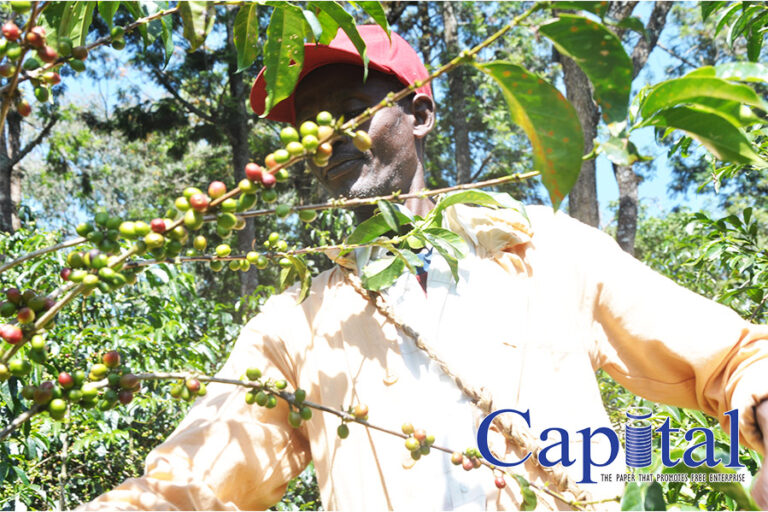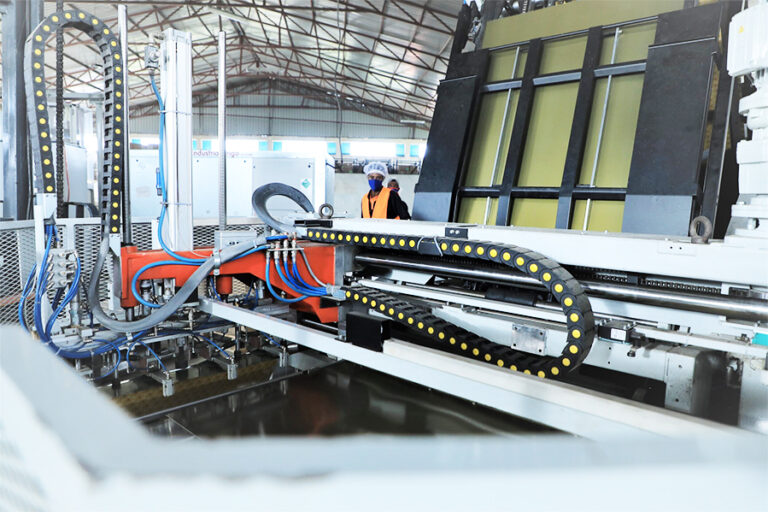The trading of local use coffee surges at the trading floor of Ethiopian Commodity Exchange (ECX) against the past experience to which experts stated that it is an unequivocal indication for the commodity coming from major producing areas preferring to use an alternative market.
It is to be recalled that Capital reported that the regional administration of Oromia took a direction to trade export coffee on an alternative market place as opposed to the electronic trading floor.
Information that Capital obtained from sources in the trading floor and coffee experts including exporters, signaled that the trading of local use coffee flourished in the first half of the trading year and sat at the top in terms of trading volume and value.
Coffee sector experts said that the in the previous circumstance the export coffee took the leading position in volume similar to value.
They said that the information they secured from the trading floor indicated that the product that came from Oromia is mainly traded in the vertical integration market that the Ethiopian Coffee and Tea Authority (ECTA) introduced about two years ago as an alternative the trading market to ECX.
On its first half year performance evaluation for the 2021/22 budget year, ECTA has also applauded the success secured from the vertical integration.
During the half year evaluation meeting, Adugna Debela, Director General of ECTA, said that the vertical integration created conducive environment to sale the bean with in short period of time and better product quality.
Recently, Adugna told Capital that to amass huge success on the export earnings and export volume the role of alternative market was crucial.
In the first half of the budget year the hard currency earnings from coffee, which is the major source of foreign currency from commodity trading, has climbed by 90 percent compared with the same period of the 2020/21 budget year.
In the first six months of the budget year that ended in the third week of December 2021, the coffee export contributed to earn USD 578 million which was USD 304 million a year ago.
Similarly the volume has also increased by about 63 percent compared with the same period of the preceding year. In the first six months of the budget year over 148,000 tones of coffee has been exported showing increment of 57,000 tones from the export of the past year similar period.
According to the information from experts in the sector in the first six months of the budget year the volume of export coffee that traded at ECX has dropped by more than half compared with the same period of last year.
Sources said that from the total coffee trading at ECX, the volume and value of local coffee took the major share by more than half, “it is unusual in the past experience.”
They said that most of the export commodity particularly comes from Oromia, which is the major source of the bean is traded through vertical integration that directly connects farmers or suppliers to export traders.
They said in the first six months of the budget year the total trading volume of export coffee at ECX has dropped by not less than 80 percent that has also reflected by value, which experts estimated to decrease by about 70 percent.
“The value reduction shall not be similar with the volume due to the price increment of coffee in the international market,” they explained why the trading value shall not equally reduce in the stated period.
In the first half of the 2020/21 budget year the export coffee trading volume at ECX was over 60 thousand metric tons, while this year exact figure is so far not disclosed by the exchange. However, experts estimated that that it would not be more than 15 thousand metric tons.
A week ago Capital reported that the price of export coffee at ECX has increased at least by three forth compared with the same period of last year.
The price of specialty, which is usually very small compared with commercial export coffee volume but has big difference in terms of price, and local coffee has also surged.
Sources indicated that the regional administration in Oromia insist coffee traders to supply the bean directly to exporters rather than selling through ECX. The decision mainly was applied since the new products mainly started to harvest from October of last year up to the coming month, while slight portion of the commodity is still sold through ECX. Meanwhile the volume of specialty coffee that traded at ECX has shown reduction in the first half of the year but that is incomparable with the percent of export coffee.
Local use coffee surges on ECX
Damages result in beverage bottle caps gap
The destruction of Walia Crown Cork factory due to the conflict has caused shortage of crown corks among bottlers.
The crown cork located at Kombolcha city, is one of the victim areas of the conflict in the region, and according to Abayneh Abebe, Industry and Investment Office Head of Kombolcha town, the factory which is said to be the largest operating crown cork factory in the country has incurred damages of more than 30 million birr, especially on its printing machineries.
“The principal raw materials required and printing chemicals have to be imported,” said Abayneh, adding that even if the factory has re-started its operation, it will not be able to operate in its full capacity.
From information that Capital has gained, different bottlers are using substandard crown corks as a result of the damage in the factory. Large bottlers including BGI, Ambo water, and other are customers of Walia.
“The company is under proses to import the necessary machineries and to re-standardize its productions” said Abayneh.
The local demand for crown cork is met through both local production and import. At present, the major source of supply to the local market for crown cork is mainly import.
Walia Crown cork factory is one of the 26 companies under the TIRET corporate established with about 268 million birr investment. Established in 1995 as an endowment organization in the Amhara regional state with an initial capital of 20 million birr, TIRET’s companies now include Tikur Abay Transport, Ambasel Trading House, Bahir Dar and Kombolcha Textile Share Companies, Dashen Brewery and Gondar Malt Factory, among others.
The factory has created job opportunities for more than 80 residents in the town has a capacity to produce two billion crown corks per year. The unsatisfied demand for beverage bottle caps is projected to be 4,284 tons and 5,615 tons by the year 2025.
TPLF group plundered large amount of products and inputs and destroyed machinery in factories located in the industrial town. Militants of the terrorist group removed machineries from factories and deprived many industries in the town of production.
According to local officials, 200 local and foreign companies have invested in the industrial town, Kombolcha in several manufacturing and production areas that create jobs for more than 8,000 people.
The town administration is now conducting a survey and investigation to find out the extent of the damage and complete destruction on the factories as part of preparation for restoration works.
Castle group acquires Meta Abo brewery
Castel group buys Diageo’s Meta Abo Brewery, with the transfer of the factory awaiting government approval.
The brewery which is based out of Sebeta, Oromia region has about 3.7 billion birr in government tax debt starting from 2017. According to sources that Capital spoke to who are close to the issue, the factory has been sold to Castel with negotiations considering the effect of the seizure of the factory by the government. However, the transaction cost is yet to be officially disclosed. The sale, which is subject to approval by the Ethiopian Competition Commission, is expected to be complete during the first quarter of 2022.
Meta Abo was sold to Diageo in 2012 after privatization at a price tag of 225 million dollars. After acquiring the factory in 2012, Diageo made 119 million dollars in investment for the expansion of the factory, and has since has pumped a total of 344 million dollars in investment throughout the years for its expansion with the aim of transforming the brewing industry in Ethiopia. The brewery also supported local communities through provision of clean water.
Meta Abo brewery was established by the Ethiopian government and Ethiopian private nationals in 1963 as a share company. Initially, the production capacity of the brewery was 50,000hl per annum, however, with Diageo’s investment, which was detailed back in 2015 saw the company re-launching the Meta brand.
Following the acquisition, Meta Abo joins BGI’s other five breweries i.e., St. George Brewery in Addis Ababa, Kombolcha Brewery, Hawassa Brewery, Zebidar Brewery and Maychew Northern Brewery with a combined production capacity of 3.6 million Hectoliters of beer annually.
The company also owns and manages the Castel Winery and vineyard located in the town of Zeway. Established in 2012, the winery produces 12,000 Hectoliters of different wine varieties annually under the brand names Acacia and Rift Valley. St George, Ethiopia’s oldest beer brand, was also bought by France’s Castel Group in 1998.
Ethiopia alternates to Kenya’s port to alleviate Djibouti dependency
Ethiopia plans to start using Port Lamu and Mombasa within a few months’ time as part of its increase of port proportion and alternative sea outlet.
“Ethiopia’s cost of land transport per kilometer is the cheapest when compared to neighboring countries. However the distance from port to destination areas is a challenge in staying competitive in the international market,” stated Dagmawit Moges, Minister of Transport and Logistics on her latest appearance at the Urban Infrastructure and Transport Standing Affairs Standing Committee of the parliament, adding that using alternative ports could solve this. “We have to stop depending on one port, as the country is big.”
According to Eng. Yehualashet Jemere Director General of Ethiopian Maritime Affairs Authority (EMAA), the ministry is preparing commandments on the utilization of port Mombasa to start operation with in short period of time, additional to having continued discussions with the government.
As Dagmawit said, Ethiopia will start using these ports within few months and it will be included in the performance of the budget year report.
Similarly, Ethiopia and Sudan have agreed to provide a plot for the port development. In addition to this Ethiopia has also been working with Kenya and Eritrea in developing port facilities.
According to the six month performance report of the transport and logistics ministry, for the first time the volume of Ethiopia cargo transaction through the Djibouti port has reduced to 83.9 percent in the past six month, that is the first half of the fiscal year.
“It is one success in our performance,” said the minister.
I previous years more than 98 percent of total import export trade of the country was through Djibouti main port.
Ethiopia managed 17 million metric tons of import export cargo in the last six month. Becoming operational just one year ago, Tadjoura port takes ten percent of cargo transaction or 731,338tons of cargo while Berbera port’s share increased to 5.9 percent.
As the minister said, minimizing logistic cost is one of the benefits of alternative ports. Ethiopia in the past six months has managed to save up to 535 million birr.
Ethiopia is one of the 16 land locked countries in Africa paying hundreds of millions of dollars annually for port service.
In the past Ethiopia had been using Eritrea’s port of Assab; the closest port to the country however that was closed after the two neighbors fought a two year long war in 1998 that killed an estimated 70,000 people.
Ethiopia, which is the biggest population without a sea outlet in the world, mainly uses ports in Djibouti which are connected by three roads and a railway network for cargo import. In the last twenty years Ethiopia had been using ports at Djibouti which has undertaken massive logistics developments to accommodate Ethiopia’s growing demand.
Ethiopia is currently looking for alternative sea ports in neighboring countries of Sudan, Kenya and Somalia to ease increasing dependency in Djibouti.
Ministry of Transport and Logistics expressed that ownership and management of seaport will be determined by the ten year transport plan. The transport sector development in general is expected to consume 3.2 trillion birr or USD 75 billion in the coming decade, while the sector that is mostly preserved for public and domestic investors will expand its playground to foreign investors in different schemes.






